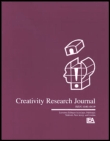
CREATIVITY RESEARCH JOURNAL
Scope & Guideline
Illuminating the Pathways of Innovation
Introduction
Aims and Scopes
- Interdisciplinary Research on Creativity:
The journal publishes studies that integrate findings from psychology, education, neuroscience, and the arts, providing a holistic view of creativity. - Empirical Methods and Innovative Assessments:
A strong emphasis is placed on empirical research, employing diverse methodologies such as experimental designs, qualitative analyses, and psychometric evaluations to assess creativity. - Cognitive and Emotional Aspects of Creativity:
Research that delves into how cognitive processes and emotional states influence creative thinking and output is a core focus, including studies on metacognition, emotional regulation, and personality traits. - Cultural and Contextual Influences on Creativity:
The journal explores how cultural contexts and social environments affect creative expression and development, emphasizing cross-cultural comparisons and the role of community and education. - Application of Creativity in Various Fields:
Topics related to the application of creativity in education, workplace innovation, art, and therapy are prominent, highlighting practical implications of research findings.
Trending and Emerging
- Impact of Technology on Creativity:
There is an increasing focus on the effects of artificial intelligence and digital tools on creative processes, exploring both challenges and opportunities presented by technology. - Neuroscientific Approaches to Creativity:
Research employing neuroscientific methods to understand the brain's role in creative thinking is gaining momentum, indicating a trend towards biological and cognitive explorations of creativity. - Creativity in Diverse Contexts:
Emerging studies are examining creativity across various contexts, such as educational settings, workplaces, and community environments, highlighting the role of context in fostering or hindering creativity. - Interdisciplinary Collaborations:
There is a notable trend towards interdisciplinary research that combines insights from psychology, art, education, and technology, reflecting a holistic approach to understanding creativity. - Social and Emotional Dimensions of Creativity:
Recent research increasingly emphasizes the interplay between social influences, emotional intelligence, and creativity, recognizing the importance of interpersonal dynamics in the creative process.
Declining or Waning
- Traditional Measures of Creativity:
There seems to be a waning interest in conventional creativity assessments, such as standardized tests, as the field shifts towards more dynamic and contextual evaluations of creativity. - Narrow Definitions of Creativity:
Research focusing on rigid or narrow definitions of creativity is decreasing, with a growing preference for broader, more inclusive conceptualizations that encompass various forms of creative expression. - Creativity in Isolated Domains:
There is a noticeable decline in studies examining creativity in isolation from other cognitive processes, as the trend moves towards understanding creativity as interconnected with emotional and social factors. - Focus on Individual Differences:
While individual differences remain important, research emphasizing singular traits or demographics as the main predictors of creativity appears to be less emphasized, in favor of more integrative approaches.
Similar Journals
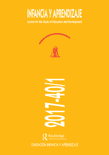
Journal for the Study of Education and Development
Advancing insights in education and development.The Journal for the Study of Education and Development, published by SAGE Publications Inc, is a leading academic peer-reviewed journal dedicated to advancing knowledge in the fields of educational and developmental psychology. Established in 1978 and operating through the United Kingdom, this journal provides a platform for contemporary research, theoretical discussions, and critical reviews that inform practices and policies in education. With an H-index reflecting its impact and citation metrics, it ranks in the Q3 category for both Developmental and Educational Psychology and Education as of 2023. Notably, it holds a Scopus rank of #722/1543 in Social Sciences - Education and #218/360 in Psychology - Developmental and Educational Psychology, placing it in the 53rd and 39th percentiles, respectively. The journal is committed to open access, ensuring that the insights found within its pages are readily available to researchers, professionals, and students alike. By contributing to ongoing dialogues and innovations in educational contexts, the Journal for the Study of Education and Development remains an essential resource for those looking to foster growth and development in educational settings.

Art & Perception
Advancing Understanding of Visual Arts and PsychologyArt & Perception, published by BRILL, stands as a pivotal journal in the exploration of visual arts and the psychology of perception. With a robust ISSN of 2213-4905 and E-ISSN of 2213-4913, this journal has established itself as an indispensable resource for researchers, professionals, and students in the fields of Applied Psychology, History, and Visual Arts. As of 2023, it enjoys impressive rankings in its categories, with a Q3 status in Applied Psychology and a Q1 status in both History and Visual Arts, reflecting its scholarly impact. The journal operates from its base in Leiden, Netherlands, and spans an impressive coverage from 2013 to 2024. While it does not currently offer open access, its commitment to disseminating valuable research makes it an essential read for those seeking to deepen their understanding of art perception and its psychological underpinnings. With a Scopus rank of #39 out of 667 in Arts and Humanities, and a remarkable 94th percentile, Art & Perception continues to shape discourse and innovation at the intersection of art and psychology.
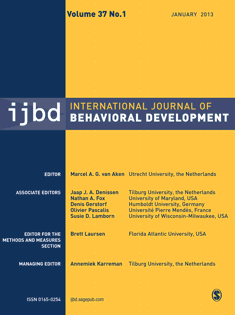
INTERNATIONAL JOURNAL OF BEHAVIORAL DEVELOPMENT
Advancing understanding of human growth and interactions.INTERNATIONAL JOURNAL OF BEHAVIORAL DEVELOPMENT, published by SAGE PUBLICATIONS LTD, is a premier academic journal dedicated to advancing the fields of developmental and educational psychology, developmental neuroscience, and social psychology. With an impressive impact factor and a Q1 ranking across multiple categories for 2023, this journal ranks among the top 25% in various social science domains, including education and lifespan studies. Its commitment to publishing high-quality research makes it an essential resource for researchers, educators, and students focused on understanding behavioral development across the lifespan. The journal aims to disseminate innovative findings, fostering a deeper comprehension of the behavioral factors that shape human growth and interactions. Through its rigorous peer-review process and global editorial standards, it not only enhances the academic conversation but also influences policy and practice in related fields. For more information, readers can access additional content through subscription or institutional access options.
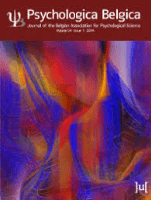
PSYCHOLOGICA BELGICA
Unveiling contemporary issues in psychology for all.PSYCHOLOGICA BELGICA is a distinguished open access journal published by UBIQUITY PRESS LTD, focusing on the broad and diverse field of psychology. Since its inception in 1975, this journal has been dedicated to the dissemination of high-quality research, making it a vital resource for researchers, practitioners, and students alike. With an impact factor that reflects its significant contribution to the field, PSYCHOLOGICA BELGICA stands out in the Q2 category of miscellaneous psychology and is ranked 75th out of 216 journals in General Psychology according to Scopus. The journal's open access model, adopted in 2004, ensures that the latest research findings are freely accessible, promoting a wider engagement with psychological science. With a commitment to fostering academic collaboration and innovation, PSYCHOLOGICA BELGICA continues to be an essential platform for advancing psychological knowledge and exploring contemporary issues within the discipline.

International Journal of Educational Psychology
Unlocking the Potential of Learning through PsychologyInternational Journal of Educational Psychology, published by HIPATIA PRESS, is a premier platform for innovative research in the fields of educational and developmental psychology. With an impact factor reflecting a growing presence in the academic community, this Open Access journal has been delivering peer-reviewed studies since its inception in 2012, facilitating worldwide accessibility and collaboration. Based in Barcelona, Spain, this journal focuses on advancing knowledge and practice in educational psychology, providing insights for educators, researchers, and practitioners alike. As it converges through the years from 2018 to 2024, the journal proudly holds a Q3 quartile ranking in both Developmental and Educational Psychology and Education categories, highlighting its dedication to impactful scholarship. By engaging with the latest findings and fostering critical discussions, the International Journal of Educational Psychology aims to enhance educational practices and inform policy making, thus shaping the future of psychology and education.
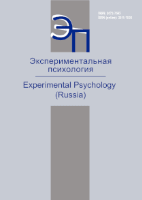
Eksperimentalnaya Psikhologiya
Bridging disciplines through groundbreaking psychological studies.Eksperimentalnaya Psikhologiya is a prominent open-access journal published by the Moscow State University of Psychology and Education, dedicated to advancing the field of psychology. Since its inception, the journal has offered a platform for the dissemination of innovative research in Experimental and Cognitive Psychology, as well as Neuropsychology and Physiological Psychology. The journal's commitment to open access, initiated in 2015, ensures that valuable research findings are freely available to scholars and practitioners worldwide. Although currently categorized in the Q4 quartile for 2023 within several psychology disciplines, it plays a vital role in promoting a diverse range of psychological studies and fostering interdisciplinary collaboration. With a focus on experimental methodology and cognitive processes, Eksperimentalnaya Psikhologiya provides a valuable resource for researchers, professionals, and students seeking to deepen their understanding of psychological science. The journal invites contributions from across the globe, particularly in the evolving landscapes of experimental techniques and neuropsychological research.
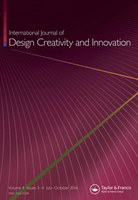
International Journal of Design Creativity and Innovation
Bridging Disciplines to Inspire Creative ExcellenceThe International Journal of Design Creativity and Innovation is a pivotal academic platform published by Taylor & Francis Ltd, dedicated to advancing knowledge and research in the interdisciplinary fields of design, creativity, and innovation. Since its inception in 2013, this journal has garnered a remarkable reputation, boasting impressive Scopus rankings such as #15 in Visual Arts and Performing Arts and #25 in Architecture, reflecting its high-impact contributions across various domains. With a consistent focus on fostering innovative approaches and solutions, it serves as an essential resource for researchers, professionals, and students alike, particularly in its well-recognized quartile standings in categories like Aerospace Engineering and Education. The journal's commitment to quality is evident through its rigorous peer-review process, ensuring that each publication is of the highest scholarly value. While it operates as a traditional subscription-based journal, accessibility to research is enhanced through various institutional agreements. As it continues to evolve until 2024, the International Journal of Design Creativity and Innovation remains an indispensable asset for anyone involved in the dynamic intersection of design and innovation.
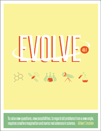
JOURNAL OF CREATIVE BEHAVIOR
Inspiring New Perspectives on Artistic MethodologiesJOURNAL OF CREATIVE BEHAVIOR, published by WILEY, stands as a leading academic platform dedicated to the exploration and dissemination of research within the realms of creativity, education, and the visual and performing arts. With its inception in 1967, this journal has continuously evolved, boasting an impressive scope that invites interdisciplinary approaches to understanding creative processes across various domains. As evidenced by its Q1 ranking in both Education and Visual Arts and Performing Arts, as well as a Q2 ranking in Developmental and Educational Psychology, the journal holds a significant position in its field, publishing high-impact research that often influences educational practices and artistic methodologies alike. Researchers and professionals will benefit from its selective content, which is well-regarded in academic circles, as reflected by its impressive Scopus rankings: it ranks in the 99th percentile in Visual Arts and Performing Arts, and remains a vital resource for students and scholars seeking to delve into the complexities of creative behavior. While the journal is not open access, it continues to serve as an essential repository of knowledge that fosters the development of innovative thinking and pedagogical advancement.

Observar
Connecting Scholars to Transform Arts EducationObservar is a prominent academic journal dedicated to the field of plastic arts education and creative expression, published by the esteemed University of País Vasco, specifically under the Department of Didactics of Plastic Expression. Since its inception in 2007, this Open Access journal has provided a vital platform for sharing innovative research, pedagogical practices, and interdisciplinary approaches that enhance the understanding of artistic education. With an ISSN of 1988-5105, Observar actively contributes to the dialogue surrounding the methodologies and implications of plastic arts in educational settings, making it an invaluable resource for researchers, educators, and students alike. Located in Bilbao, Spain, it aims to foster a global community of practice that encourages critical engagement and collaboration in the pursuit of excellence in arts education.
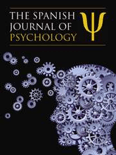
Spanish Journal of Psychology
Advancing the Frontiers of Psychology and LinguisticsThe Spanish Journal of Psychology, published by Cambridge University Press, serves as a vital platform for scholars and practitioners in the fields of psychology and linguistics. With an ISSN of 1138-7416 and an E-ISSN of 1988-2904, this esteemed journal has consistently maintained a rigorous publication standard since its inception in 1998, continuing its journey through to 2024. Notably, it holds a prestigious Q1 ranking in Linguistics and Language and a Q2 ranking in Miscellaneous Psychology, reflecting its significant impact on academic discourse. The journal is recognized for its comprehensive coverage, catering to diverse topics within psychology while fostering interdisciplinary approaches with linguistics. Researchers and students will find valuable insights and cutting-edge research articles that contribute to the advancement of knowledge in these dynamic fields. Although it operates under a subscription model, the journal's impact is underscored by impressive Scopus rankings in various categories, including a 90th percentile ranking in Social Sciences, making it an essential resource for those seeking to enhance their understanding and research capabilities.